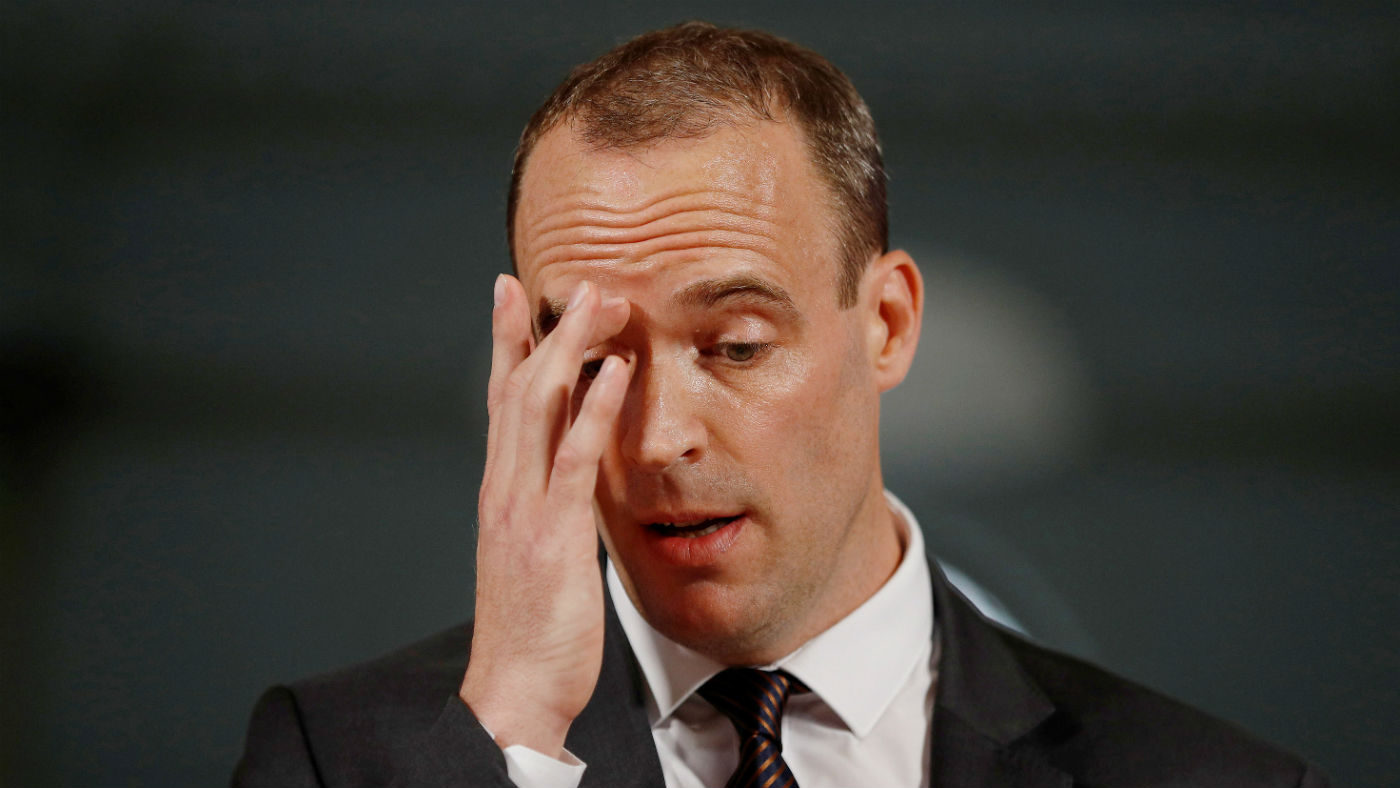‘Boris Johnson will be quite happy to ride out the storm over Dominic Raab’
Your digest of analysis and commentary from the British and international press

- 1. Will Dominic Raab be shamed into resigning? Given this government, I very much doubt it
- 2. Why is life on Earth still taking second place to fossil fuel companies?
- 3. The illusion of privacy is getting harder to sell
- 4. The triple lock fudge is not about young vs old - it ruins everyone’s pension
- 5. Germany must end the confusion over security and defence
A free daily email with the biggest news stories of the day – and the best features from TheWeek.com
You are now subscribed
Your newsletter sign-up was successful
1. Will Dominic Raab be shamed into resigning? Given this government, I very much doubt it
Chris Stevenson for The Independent
on ministerial shamelessness
“It would be fair to say it has not been an ideal few days for the foreign secretary, Dominic Raab,” writes Chris Stevenson for The Independent. He reminds us that the minister was criticised for being on holiday in Crete when Kabul was falling to the Taliban and then lambasted for his demeanour during the Afghanistan debate in the Commons. “Will Raab be shamed into giving up his post?” Stevenson asks. “I very much doubt it,” he answers. “With the amount of recriminations flying around about how Afghanistan now faces this situation given the 20 years of UK involvement, I’d speculate that Johnson will be quite happy to just ride out the storm.”
The Week
Escape your echo chamber. Get the facts behind the news, plus analysis from multiple perspectives.

Sign up for The Week's Free Newsletters
From our morning news briefing to a weekly Good News Newsletter, get the best of The Week delivered directly to your inbox.
From our morning news briefing to a weekly Good News Newsletter, get the best of The Week delivered directly to your inbox.
2. Why is life on Earth still taking second place to fossil fuel companies?
George Monbiot for The Guardian
on futile gestures
“Almost everyone is now at least vaguely aware that we face the greatest catastrophe our species has ever confronted,” writes George Monbiot for The Guardian, “yet scarcely anyone alters their behaviour in response: above all, their driving, flying and consumption of meat and dairy.” Our rulers are no better, he feels, writing that “as our house burns, the government sends in the tanker trucks to spray petrol on the flames”. The long-standing environmental activist adds that “unless we leave fossil fuels in the ground, any commitment to stop climate breakdown is merely gestural” and warns that “the atmosphere does not respond to gestures”.
A free daily email with the biggest news stories of the day – and the best features from TheWeek.com
3. The illusion of privacy is getting harder to sell
Greg Bensinger for The New York Times
on tech companies’ limits
Apple may say “relentlessly, that privacy is the central feature of its iPhone”, but “that’s only true until Apple changes its mind about its policies”, wrote Greg Bensinger at The New York Times. You’d be “forgiven for being a little creeped out” by the tech company’s latest proposition of scanning people’s phones for “known illegal pornographic images”. It’s not only this “that should give users pause”, notes Bensinger. “If Apple believes that tracking is anathema to privacy” then why not “disable tracking as a default?” he asks. “Tech companies would like us to believe that they hold the keys to their own privacy”, but ultimately “our data is as secure as their policies”.
4. The triple lock fudge is not about young vs old - it ruins everyone’s pension
Taha Lokhandwala for The Telegraph
on a policy U-turn
While “it should come as no surprise that the government” will go back on its 2019 manifesto pledge to maintain the state pension triple lock, the simple fact is the UK’s state retirement benefit “is not good enough”, writes The Telegraph’s deputy personal finance editor, Taha Lokhandwala. One pension firm indicates that an 8.8% rise still leaves the payment below the figure “deemed necessary for the minimum acceptable standard of living”. And not only that, breaking the triple lock “hurts those more likely to vote Conservative”. The debate “is not about young versus old”, Lokhandwala adds. This not only affects pensions “but everyone who will retire in the future”.
5. Germany must end the confusion over security and defence
Bastian Giegerich for the Financial Times
on the need for a new mindset
A seven-month mission in the Indo-Pacific region being undertaken by a German frigate has been “heralded as a symbol of a new geopolitical seriousness in Berlin” – but it is more representative of “the confusion at the heart of German security and defence policy”, writes Bastian Giegerich in the Financial Times. Much of the country’s security debate is “informed by ideas that are of dubious value”, and “the next German government should abandon the shibboleths of the Merkel era”, he continues. As the power of “resurgent, revisionist and repressive powers” rises, Germany’s “postwar security and prosperity” are at risk. A strategic mindset is needed, Giegerich concludes, otherwise “the coming decades will provide a hard education for Berlin”.
-
 American universities are losing ground to their foreign counterparts
American universities are losing ground to their foreign counterpartsThe Explainer While Harvard is still near the top, other colleges have slipped
-
 How to navigate dating apps to find ‘the one’
How to navigate dating apps to find ‘the one’The Week Recommends Put an end to endless swiping and make real romantic connections
-
 Elon Musk’s pivot from Mars to the moon
Elon Musk’s pivot from Mars to the moonIn the Spotlight SpaceX shifts focus with IPO approaching
-
 Woman accidentally puts nan in washing machine
Woman accidentally puts nan in washing machineTall Tales And other stories from the stranger side of life
-
 Penile fracture risk higher over Christmas
Penile fracture risk higher over ChristmasTall Tales And other stories from the stranger side of life
-
 Thieves who stole shopping bag in for big disappointment
Thieves who stole shopping bag in for big disappointmentTall Tales And other stories from the stranger side of life
-
 Confused man's front lawn is stolen
Confused man's front lawn is stolenTall Tales And other stories from the stranger side of life
-
 Bangladesh dealing with worst dengue fever outbreak on record
Bangladesh dealing with worst dengue fever outbreak on recordSpeed Read
-
 Glacial outburst flooding in Juneau destroys homes
Glacial outburst flooding in Juneau destroys homesSpeed Read
-
 Woman bombarded with Amazon packages she didn’t order
Woman bombarded with Amazon packages she didn’t orderfeature And other stories from the stranger side of life
-
 China’s ‘breathtaking’ infiltration of UK economy: an existential threat?
China’s ‘breathtaking’ infiltration of UK economy: an existential threat?Talking Point New report suggests Beijing is exerting political and economic influence on Westminster